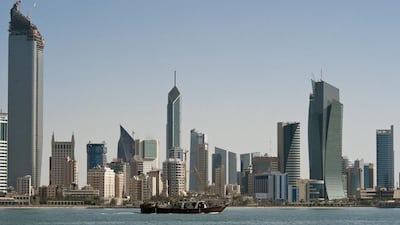KUWAIT CITY // Last month, two dozen young Kuwaitis each pitched a tent outside the government’s housing authority to protest what surveys say has become the most pressing social problem in the country.
The name of the organisation to which the men belonged said it all – Nater Bait or Waiting for a House.
Every married Kuwaiti couple is entitled to a house or apartment, or land and a loan to build or buy one. But with a backlog of 106,747 housing applications, few of those waiting expect to have their own accommodation anytime soon.
With a government poll in September showing that the country’s housing shortage is the top concern of Kuwaitis, parliament has decided it must address the issue. The emir has called for something to be done, and the cabinet says it is ready to swing into action.
“Any which way you cut it, whether from a constituency point of view, gender point of view, educational point of view, or age point of view, housing is always the number one priority” for citizens, said the minister of state for cabinet affairs, Sheikh Mohammad Abdullah Al Mubarak Al Sabah. “The government will try now to make things happen on the housing front.”
Actions will prove more difficult than words, however, and anything but a concerted government campaign to relieve the housing shortage is likely to strain the patience of Kuwaitis, particularly young couples, who say they struggle to move out of their parents’ homes.
“You have to be from a privileged background to have a home in Kuwait now,” said Dhari Al Rujabi, a youth activist and general coordinator for the Progressive Current political group. “I’d say 90 per cent of youth don’t have a house.”
Kuwait’s housing crisis arises from a combination of rising demand and bureaucratic delays.
More than half of Kuwait’s citizens are under the age of 25, and roughly 80 per cent of young couples apply for state housing, a May study by the London School of Economics found. Government statistics for this year show that nearly 6,000 new applicants had already registered for housing through the end of September.
Under Kuwati law, every Kuwaiti couple is entitled to a government house built on 400 square-metre plot or a 400 square-metre apartment.
The choice of a plot of land comes with a 70,000 dinar (Dh910,000) long-term, interest-free loan. Opting instead to purchase a house or apartment of at least 360 square metres on the open market comes with a 70,000 dinar long-term, interest-free loan.
The problem is that ground for new housing hasn’t been broken fast enough to keep pace for couples choosing these options, so the government now faces a crunch – an estimated 174,000 new homes will be needed by 2020. In its 60-year history, the public housing programme has provided 93,040 homes.
Another predicament is space. The entitlement of a 400 square-metre plot of land is difficult to accommodate in Kuwait City’s already congested centre. Where there is room for new housing developments is on the outskirts of the capital, where there are not enough roads schools, hospitals and other infrastructure necessary to make them viable.
All government-allocated homes are not created equal, either. Properties closer to the city garner higher prices, which has allowed some homeowners to resell their government-granted property for a profit, the LSE report says.
The combination of shrinking demand and rising speculation has driven up prices. On the open market, housing prices have risen at a rate of 8.3 per cent every year since 2000, according to figures from Kuwait’s Al Shall Consulting.
“Even a small house costs US$2 million (Dh7.34 million)”, said Bashar Al Sayegh, the editor of the Kuwaiti daily Al Jareeda. “We cannot buy houses, and we also cannot rent. Even a flat costs 3,000 Kuwaiti dinars monthly”, far less than the 150 Kuwaiti dinar rent subsidy the government offers to couples on the waiting list for homes.
Some analysts say privatising parts of the housing system is the only way to erase the backlog. Allowing private developers to build housing could help lower real-estate prices by increasingly supply. Space would still pose a problem, however, since more than 95 per cent of Kuwait’s land is government-owned.
Critics of the Kuwaiti government’s housing policies say there has been no shortage of funds to address the problem. Mismanagement, they say, is the problem.
The government knows what the housing needs are, and all it has to do is allocate money for construction, said Hamad Al Matar, a former MP and opposition member.
Corruption also has slowed construction, Mr Al Matar said, offering a hypothetical: “If I want to build my house, I have to give 2,000 or 3,000 dinars in order to finish it in time. Otherwise, I will face problems.”
edickinson@thenational.ae

